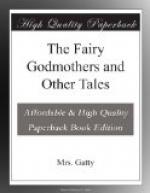Joachim took a pencil, and sat down. Now he thought he should be able to please his Mother; but, alas, he found to his surprise, that the fine faces he tried to recall had not left that vivid impression on his brain which enabled him to represent them. On the contrary, he was tormented and baffled by visions of the odd forms and grotesque countenances he had so often pictured. He seized the Indian-rubber and rubbed out nose after nose to no purpose, for he never could replace them with a better. Drawing was his favourite amusement; and this disappointment, where he expected success, broke down his already depressed heart. He threw the book from him, and burst into a flood of tears.
“Joachim! have you drawn him? What makes you cry?”
“I cannot draw him, Mother,” sobbed the distressed boy.
“And why not? Just look here; here is an admirable likeness of squinting Joe, as you have named him. Why cannot you draw the handsome boy?”
“Because his face is so handsome!” answered Joachim, still sobbing.
“My son,” said his Mother gravely, “you have now a sad lesson to learn, but a necessary and a wholesome one. Get up, desist from crying, and listen to me.”
Poor Joachim, who loved his mother dearly, obeyed.
“Joachim! your Aunt, and your Cousins, and your schoolfellows have all called you clever. In what does your cleverness consist? I will tell you. In the Reproduction of Deformity, Defects, Failings, and Misfortunes of every sort, that fall under your observation. A worthy employment truly! A noble ambition! But I will now tell you the truth about yourself. You never heard it before, and I feel sure you will benefit now. A good or an evil Genie, I know not which, has bestowed upon you a great power; and you have misused it. Do you know what that power is?”
Joachim shook his head, though he trembled all over, for he felt as if awaking from along dream, to the recollection of the Genie.
“It is the power of Imitation, Joachim; I call it a great power, for it is essential to many great and useful things. It is essential to the orator, the linguist, the artist, and the musician. Nature herself teaches us the charm of imitation, when in the smooth and clear lake you see the lovely landscape around mirrored and repeated.[5] What a lesson may we not read in this sight! The commonest pond even that reflects the foliage of the tree that hangs over it, is calling out to us to reproduce for the solace and ornament of life, the beautiful works of God. But oh, my son, my dear son, you have abused this gift of Imitation, which might be such a blessing and pleasure to you.”
[5] Schiller.—“Der Kuenstler.”
“You might, if you chose, imitate every thing that is good, and noble, and virtuous, and beautiful; and you are, instead of that, reproducing every aspect of deformity that crosses your path, until your brain is so stamped with images of defects, ugliness, and uncouthness, that your hand and head refuse their office, when I call upon you to reproduce the beauties with which the world is graced.”




